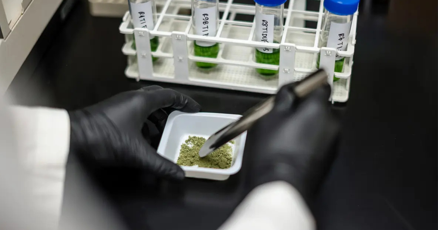[[{“value”:”
“Texas lawmakers expand medical marijuana program eligibility amid looming hemp ban” was first published by The Texas Tribune, a nonprofit, nonpartisan media organization that informs Texans — and engages with them — about public policy, politics, government and statewide issues.
Sign up for The Brief, The Texas Tribune’s daily newsletter that keeps readers up to speed on the most essential Texas news.
A bill that will expand the conditions eligible for the state’s medical marijuana program, including chronic pain and Crohn’s disease, and allow for vapes to be sold by prescription is heading to Gov. Greg Abbott’s desk.
House Bill 46 by Rep. Ken King, R-Canadian will allow patients in the state’s medical marijuana program to use products like cannabis patches, lotions, and prescribed inhalers and vaping devices. The House rejected last week an amendment by the Senate that would have scaled down the scope of the program by removing several proposed qualifying conditions including chronic pain. The two chambers reached an agreement and added back chronic pain, traumatic brain injury and Crohn’s disease as qualifying conditions and removed a stipulation that required chronic pain patients to try opioids for 90 days.
The bill will also allow licensed dispensers to open more satellite locations, which supporters say is necessary to prevent the industry from collapsing, and adds nine dispensers, pushing the total to 12.
Sen. Charles Perry, R-Lubbock, said the first three dispensers will be picked from the previously submitted list, and then it will be opened up to the public.
In Texas, licensed medical cannabis providers must house all operations — including cannabis cultivation, processing, extracting, manufacturing, testing, and dispensing — under one roof.
State regulations also prohibit inventory storage of medical cannabis products in multiple locations, so products must be distributed from the central dispensary. Any prescriptions scheduled for pickup outside the central dispensary must be driven daily to and from the pickup location — sometimes thousands of miles round-trip.
This has made their products more expensive and limited where the medical marijuana program can reach, hampering the small medical cannabis market in Texas.
HB 46 is meant to correct some of this problem by allowing medical marijuana distributors to store their products in various satellite locations instead of having to drive across the state to return the product to the original dispensary every day.
“This should help alleviate some of the costs because they will be able to store it in those distribution centers,” said Perry.
However, the most significant potential change would be allowing vaporized and aerosol marijuana products, such as vapes, into the program, helping to match the popularity of products found in the hemp industry. The Texas medical program can currently only sell gummies, lozenges, topicals, beverages, and tinctures, as smoking or vaping products have not been approved.
Many hemp products, which are unregulated and sold more freely in smoke shops, also give the same high as medical marijuana, but are cheaper for consumers, and don’t require a visit to a medical professional for pre-approval to purchase. This ease of access has pretty much made the medical marijuana program irrelevant, according to the medical marijuana industry.
Texas lawmakers recently passed a bill that will essentially wipe out the hemp market, and the blowback has been noticed.
“What we have done this session, members, is eradicate bad actors who are poisoning our community, children and adults, and making a massive profit off people,” said Lt. Gov. Dan Patrick, during the hearing for HB 46. “We have wiped them out and are now building one of the biggest Compassionate Use Programs in the country.”
Some of the most vigorous opposition to the all-out ban on hemp products has come from those who use it for medical purposes. Veterans, parents of children with mental health or physical disabilities, and the elderly spoke to lawmakers this year about the importance of having easy access to hemp products, not the medical marijuana program.
“I want to reiterate since we got so many calls. This body has always made a commitment to our veterans. But we also have a commitment to our kids, and it’s to keep them safe from narcotics that they shouldn’t be doing until they are 25 and under a medical setting,” said Sen. Roland Gutierrez, D-San Antonio, during the hearing Tuesday night. “Never under any terms did we intend for a child to go to the convenience store and get a vape pen. We had to grab the reins of a pretty strong horse. We all had to do that, and we all got grief for it, but we never authorized it in the first place.”
First round of TribFest speakers announced! Pulitzer Prize-winning columnist Maureen Dowd; U.S. Rep. Tony Gonzales, R-San Antonio; Fort Worth Mayor Mattie Parker; U.S. Sen. Adam Schiff, D-California; and U.S. Rep. Jasmine Crockett, D-Dallas are taking the stage Nov. 13–15 in Austin. Get your tickets today!
Correction, June 2, 2025 at 11:43 a.m.:
A previous version of this article incorrectly described the status of the bill. It was in a conference committee, not headed to the governor.
Correction, May 28, 2025 at 1:33 a.m.:
An earlier version of this article incorrectly stated that a bill expanding the state’s medical marijuana program would allow smokable products. The only new methods that would be legalized are vaporized and aerosol products.
This article originally appeared in The Texas Tribune at https://www.texastribune.org/2025/05/27/texas-medical-marijuana-weed-hemp/.
The Texas Tribune is a member-supported, nonpartisan newsroom informing and engaging Texans on state politics and policy. Learn more at texastribune.org.
COPYRIGHT 2025 BY CROSSROADS TODAY. ALL RIGHTS RESERVED. THIS MATERIAL MAY NOT BE PUBLISHED, BROADCAST, REWRITTEN OR REDISTRIBUTED.
”}]] “Texas lawmakers expand medical marijuana program eligibility amid looming hemp ban” was first published by The Texas Tribune, a nonprofit, nonpartisan media organization that informs Texans — and engages with Read More


